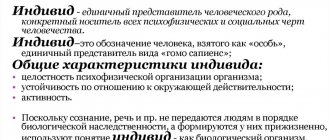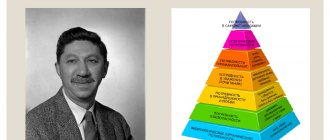Reflection and self-reflection are often perceived as synonymous words, which is actually not entirely true. There is a fine line between them. Reflection is a reflection of the surrounding reality in the human mind. What a person sees and perceives is not objective reality, but only its reflection. Through all sensory systems you read the world around you, but no one can fully comprehend it. And what objective reality is is also unattainable for human perception.
Self-reflection is a person’s ability to analyze what is reflected inside him. Any events or external stimuli give rise to a response from the human brain. These are thoughts, feelings and sensations. Careful observation of your internal processes, their analysis, behavior change - this is self-reflection.
In this article:
What is this ability? Does everyone have this ability? Self-reflection training
What is reflection and reflexivity
“Reflecto” translated from Latin means “return back.” The same term in French sounds like “reflexio” and means “thinking, reflection.”
Initially, the concept of reflection appeared in philosophy as a tool for observing the external world and a way of understanding human existence.
Through the analysis of phenomena occurring in nature and society, a person gets to know himself, seeks ways for survival and self-improvement. Today, the process of reflection is studied and used in other fields, in sociology and psychology. Reflection is a person’s look inside himself, analysis of his thoughts and actions and rethinking them.
But this process is not thoughtless, but based on acquired knowledge and experience, examined through one’s own mistakes. In addition, in sociology it is the ability to evaluate other people and make comparisons between them and oneself.
Reflexivity is the ability to analyze oneself, identify the motives of one’s own actions, including:
- past actions and events;
- successful or unsuccessful performance results;
- emotional state;
- personality traits and character that change over time.
The degree of reflection is different for each person and depends on the level of knowledge, intelligence, and upbringing. Some people constantly think about their actions and their motives, while others don’t think about them at all. An important role in this is played by a person’s desire to realize his misconceptions and mistakes, the ability to self-criticize and the need to compare himself with the people around him.
Write down your thoughts
Some people may find it helpful to write down their thoughts as they self-reflect.
Journaling is a popular way of self-reflection as it keeps everything in one place and allows you to look back on what you were previously thinking to keep you on track.
This can also be helpful if you are having trouble letting go of a particular thought. Once a thought is written down and safely stored, you may find that the mind can let it go more easily without fear of forgetting.
Reflection in psychology
A sign of a mature person is the ability to accept responsibility for her actions and the life she has. If a person constantly blames others and circumstances for what happens to him, he is considered weak. Changing your worldview can be difficult.
Reflection in psychology is used precisely for such purposes. As a separate, independent topic in psychology, reflection was highlighted by A. Busemann. This scientist suggested that this process is nothing more than the transfer of circumstances of the external world to oneself.
In Russian science, the problems of reflection were studied by such scientists as L.S. Vygotsky, S.L. Rubinstein, B.V. Zeigarnik. In their opinion, the basis of the concept is thinking, leading to self-understanding, the ability to find the motivation for one’s actions, and answers to questions about personal characteristics. Scientists first defined reflection as an opportunity to “learn the truth about oneself.”
Today, reflection is one of the main directions in psychology used to expand the client’s consciousness. For example, if a person is stressed due to negative daily thoughts, but does not understand this, then he will not be able to get rid of his bad mood. In this case, it is possible to stop suffering only by understanding the underlying cause of the decadent mood, and by determining steps to eliminate it.
With a conscious decision, you can stop the flow of unnecessary thought forms and accept yourself in the “here and now” state. The specialist encourages you to look at yourself “from the outside,” as if at the hero of a series on a TV screen. The goal of a good psychologist is to teach independent introspection and obtain answers to nagging questions. Within psychology, reflection and introspection are identical concepts.
When analyzing a certain situation or action, it is necessary to realize and work through the following points:
- A person’s sense of self at the current moment in time. What he experiences: anger, fear, shame, guilt, resentment, etc.
- A weak point in self-awareness that has been damaged by events that have occurred. For example, inflated expectations regarding the behavior of a spouse or other family members, which led to resentment.
- The ability to use the situation, as well as the difficulties that arise, to your advantage.
Reflection promotes understanding of how a person is perceived from the outside, and not just for self-analysis. The result of reflectivity is self-analysis, the formation of desired personal characteristics, and an understanding of the connection between actions and results.
Psychological reflection functions in the following directions:
- Consciousness control, which includes awareness of one’s own thoughts and actions. Formation of logical thinking.
- Understanding your strengths and weaknesses is self-criticism. The ability to recognize the relationship between current events, successes, failures and actions taken.
- Finding the keys to solving complex problems and tasks. The ability to plan your steps to achieve goals.
- Getting rid of destructive, destructive attitudes and thought forms.
- Finding opportunities to make thoughtful, correct, useful decisions.
- Accumulation and identification of latent abilities, talents and resources.
There is an opinion in psychology that reflection is not always good. In practice, there are cases when soul-searching and excessive thinking led to negative consequences (“woe from mind”, “many knowledge, many sorrows”). For this reason, it is important to learn to reflect competently, preferably accompanied by an experienced specialist.
Give yourself time, but know when to stop.
As mentioned above, self-reflection can compromise the state of rumination or overthinking.
When we allow a thought to cycle through our minds over and over again with no apparent way to resolve it, we lose all the benefits of internal reflection and can end up harming our mental well-being.
Therefore, it is important to set a limit for how long you sit in quiet contemplation. You may want to set aside a specific amount of time or simply say it's time to stop when you're stuck in a chain of thoughts.
And when it's time to stop, the best thing to do is move somewhere else. This is why it is generally not recommended to ruminate about yourself before going to bed. Do this well before the end of the day or at any other time, but not before bed.
To separate yourself from internal rumination, try going inward and focusing on something other than what you were ruminating about. Anything that can take your mind away from what you were thinking about.
Concept of self-reflection
Self-reflection is often identified with reflection. This is partly true. The difference between the concepts is that the prefix “self” indicates a reflection of oneself, and not just the external world, events and other people.
Self-reflective people constantly listen to their own feelings and emotions and try to analyze them. Such exercises are very useful for understanding your own self, personal desires and needs. How often do we focus on the expectations of other people, looking for an assessment of our actions from the outside. As a result, one’s own dreams and internal needs remain unfulfilled.
Young people enter training in prestigious professions, and their souls are drawn to creative delights. As a result, the profession does not bring satisfaction, but the parents are happy! A person lives an uninteresting life, suppressing existing talents.
There is another side. In hypertrophied cases, a person constantly listens to emotions. He becomes fixated on personal experiences and becomes neurotic, not seeing the outside world, which is beautiful. A person stops enjoying life, constantly analyzing his own condition.
In this case, it is important to get out of yourself in time, take a deep breath, feel material things: table, floor, wall, hands, feet, sounds and smells.
Many people are wary of their own body signals. Often, excessive reflection leads to neurotic diseases, for example, hypochondria (a pathological condition in which we find ourselves with all possible and impossible diseases).
Cases have been recorded when women find all the signs of pregnancy, and only the results of repeated laboratory examinations (for example, ultrasound) can dissuade them from this. Of course, if you suspect a disease, you must undergo a medical examination. But when a person realizes that his fears are far-fetched, he should move away from focusing on personal feelings and ignore them.
Improved Decision Making
We make hundreds of choices every day, but most of them are minor and can be left to our unconscious mind.
But when it comes to the bigger decisions in life, a little personal reflection is invaluable.
It comes back to clarity of thought and awareness of your true values.
By using these two things, you can make decisions that put you on the optimal path to greater well-being.
This means fewer regrets or missed opportunities and more peace of mind knowing you made the right choice.
Forms and types of reflection
We described reflection as a complex process directed both within oneself and into the external world, leading to benefit for the individual, or, on the contrary, to its destruction. Let's consider what forms and types of introspection exist in psychology.
From the point of view of the impact on the future state of a person:
- Correct constructive self-analysis, which allows you to understand yourself, draw logical conclusions and not step on familiar mistakes again.
- Harmful destructive self-analysis, leading to neurotic disorders and deep fixation on problems, often imaginary. In such situations, feelings of guilt, helplessness and hopelessness are cultivated. A person needs the help of a specialist.
Taking into account time periods, reflection occurs:
- Event-based or situational . The individual analyzes a problem that takes place in the present time, “here and now.”
- Retrospection , looking to the past. A person evaluates past events and his actions, draws conclusions about their correctness and timeliness.
- Perspective , facing future events. The individual plans further actions and events based on self-analysis.
Based on the object of study, the process can be divided into the following forms:
- Self-reflection , turning to one’s own inner world, personal experiences and emotions.
- Communicative . In this form, reflection is devoted to other people, interaction with friends, relatives, and colleagues. A person tries to analyze relationships and interactions.
- Sanogenic is a type of self-analysis in which a substantive study of strong emotions is carried out, a search for means to minimize or eliminate unnecessary suffering and experiences.
- Intelligent . The individual’s attention is focused on the application of knowledge, skills, and the possibilities of their use in the material world.
A combination of forms of reflection under given conditions gives the best results; it is always necessary to combine methods of analysis for a specific situation.
Personal Development Tools
Entrepreneurs and coach-motivators Mikhail Levchenko and Evgeniy Nekoz in their video conversation about the importance of retrospective analysis (reflection).
How did Garry Kasparov become the greatest chess player and why keeping a diary will help you become a better person?
Time codes for quick search:
1:00 Reflection, what is it?
3:05 The diary is your new assistant
4:45 Noticing what happens to you every day and about the gratitude journal
7:12 Everything new is long forgotten old
9:45 The main thing is to do it daily
12:10 How to plan this?
Read more: Adult relationships and communication with mom (for an adult daughter)
Reflection helps you develop your skills and evaluate their effectiveness, rather than just continuing to do what you've always done. It's about asking positive questions about what you're doing and why you're doing it. And then decide if there is a better or more efficient way to do it in the future.
In any role, whether at home or at work, reflection is an important part of learning. You wouldn't use a recipe a second time if the dish didn't work the first time, would you? You will either adjust the recipe or find a new and, probably, better one. When we study, we can get stuck in routines that may not work effectively. Thinking about your own skills can help you identify changes you may need.
What does it mean to reflect?
To reflect is to think, to think logically, to analyze actions and actions, to know oneself.
Is it worth understanding your personality? Of course yes. If a person has not understood himself, he is led by others and lives someone else’s life. Low self-esteem, complexes, and feelings of guilt sit deep inside and interfere with further development. They need to be found and neutralized.
By reflecting, we learn:
- Think rationally.
- Stop mental “garbage”.
A low level of self-analysis is the path to making the same mistakes and blunders throughout your life. At the everyday level, the concept of a reflective person is often associated with such definitions as: “to be nervous”, “to worry”, “to worry too much”. Therefore, in any action, moderation and reasonableness are important.
It is necessary to approach your inner world soberly and calmly, without allowing emotions to overwhelm the arguments of reason. A person who knows how to reflect is his own psychoanalyst; not everyone is capable of this.
In order to “self-examine” for the benefit of your business, you need to avoid the following mistakes:
- You should think about the motives for your actions, not the actions themselves . For example, a husband who cheated on his wife may realize his betrayal and vow not to do it again. But if a man does not understand what pushed him to cheat, no force will stop him from repeating the mistake, since the motives for the need to go “to the left” will remain undeveloped.
- “Saw sawdust ,” as D. Carnegie said. This means constantly grinding past sins and failures in your head, coming up with possible other consequences of what has already happened. What was is no longer there, think about the current moment, make plans for the future.
- Cultivate feelings of guilt . Yes, we made a mistake, but we got our lesson for it. There is no point in berating yourself for something that cannot be fixed. Everything is not without sin.
- Responsible for the whole world . Processes in the world occur against our will. We should not take responsibility for something we cannot influence.
If you follow the rules outlined, then reflection is not only possible, but also useful.
Reflexivity
Within the framework of the reflexive-humanistic approach, the mechanism of reflection is understood as the comprehension and rethinking of thinking stereotypes and their heuristic overtones to the extent that it creates new (creative-innovative) content of thinking.
Within the framework of this approach, the main reflexive psychological terms are considered: reflexivity, reflexive ability, reflexive readiness and reflexive competence.
Reflexivity is a characteristic of personality types, value orientations, ways of life, distinctive features of people’s communication and interaction, during which reflection develops.
Reflective ability is the ability of a subject (individual or group) to reflect on various types and areas of their activity, that is, the ability to give a reflective quality to any process (including the process of network therapy) and functional structure.
The readiness to actualize and implement reflexive ability is called reflective readiness, which allows reflexivity to be included in the existing conditions of a person or any other system.
Reflexive competence is a professional characteristic of an individual that allows for the implementation of reflexive processes and the effective and adequate implementation of reflexive abilities. This encourages creativity and ensures maximum process efficiency.
Reflective competence is a complex entity. The subject of reflection can be an individual: knowledge about the role structure and positional organization of collective interaction; ideas about the inner world of another person and the reasons for his actions; own actions, behavior and images of oneself as an individual.
It is important to clarify those perspectives for the interpretation of reflection that allow the psychotherapist to optimize the reflexive competence of pedagogical, parental, children's and other associations in crisis situations.
How to develop reflection
The best way to learn a skill is to start practicing it. To develop reflection, you need to start practicing it.
How to do it?
- Try to understand what feelings you are experiencing at the current moment. The habit of being attentive to emerging joy, anger, melancholy and connecting them with ongoing events or communications with certain people.
- Monitor stories in which you react too harshly, painfully. If certain events hit you particularly hard, you need to understand what the trigger is.
- If you notice that in the process of thinking about something you experienced melancholy or painful emotions, then it is better to stop soul-searching and return to the roots of the problem a little later. Highly sensitive people cannot do without the help of a specialist.
- Give up total control of reality. Reflection is not a reason to put the material world into pieces. Allow life to flow outside of your participation.
- In the evening, you can “scroll” your day in your head, all its pros and cons, and form plans for tomorrow.
- To develop reflection, make it a rule to think systematically about any phenomenon or object that interests you.
After gaining reflection skills, you can ask yourself a few questions and give honest answers to them:
- Think about whether there is something in the past that would be worth returning to and trying to start over. This could be family, work, hobbies, friends, etc. Sometimes a return to the past means the beginning of a new stage.
- Clearly establish for yourself what brings pleasure and makes you happy. This will be the strategic goal to which you should devote your future life.
- If you are not happy with the point you are in now, determine the actions you need to take to get out of it. Do not slip into self-flagellation or attribute all problems to external circumstances.
- Truthfully answer the question of what you are doing wrong. You should not wring your hands with the question: “Why do I need this?” Take responsibility for failures personally. Where was the mistake, the flaw? The truth can be unpleasant, but without it it’s difficult to fix anything.
- If you fail at a question, analyze whether everything possible has been done or whether you can try something else.
- Analyze actions from the point of view of achieving the goal. This does not mean that you cannot be spontaneous and that you need to think through every step. However, when time is short, prioritization becomes necessary.
There is an opinion that the purpose of life is life itself, getting pleasure from it and those things that correspond to our internal needs. Reflect wisely, achieve what you want and be happy!











